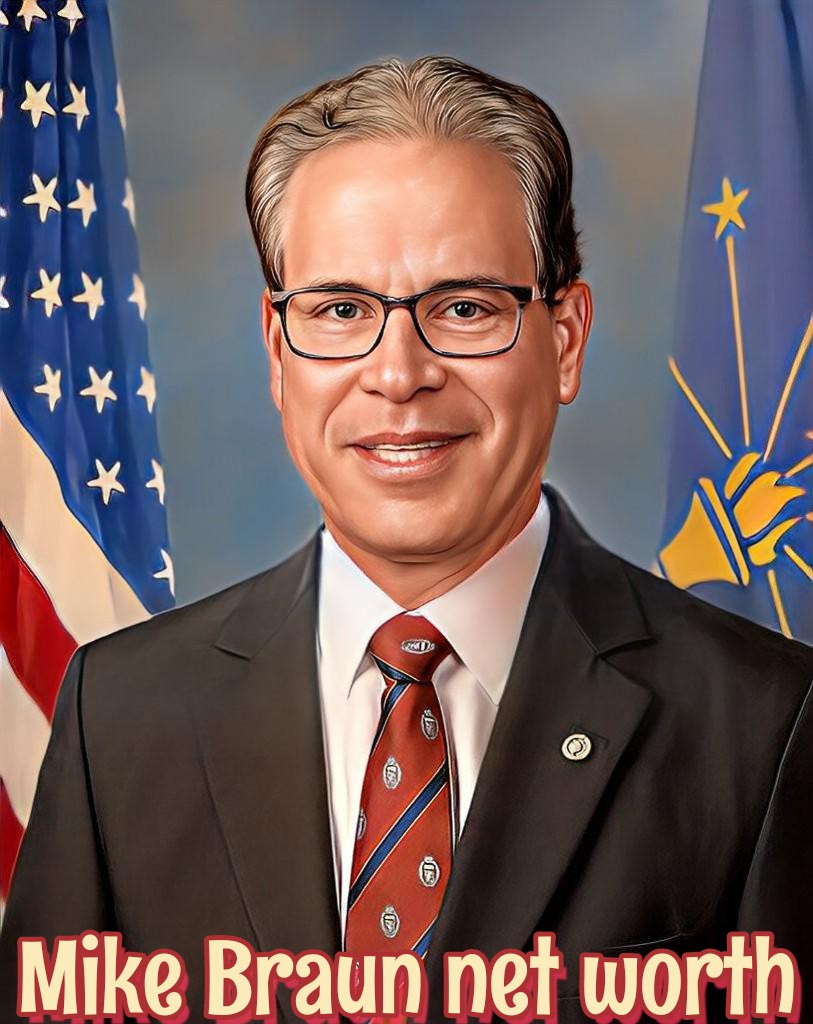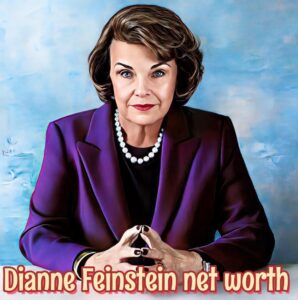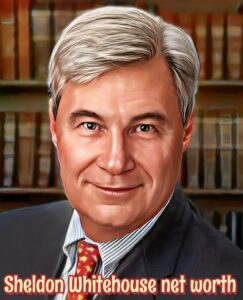| Mike Braun | Net Worth: $35 million |
|---|---|
| Full Name | Michael K. Braun |
| Date of Birth | March 24, 1954 |
| Nationality | American |
| Occupation | Politician, Businessman |
| Current Position | U.S. Senator from Indiana |
| Political Party | Republican |
| Net Worth | $35 million |
| Spouse | Maureen Braun |
| Children | 4 |
In 2026, Mike Braun continues to hold a prominent position in U.S. politics, especially within the Republican Party. Before entering the political arena, Braun had already built a strong financial foundation as a successful businessman in the manufacturing and distribution industries. His entry into politics came after years of running his own company, but it was his astute business acumen that helped him rise to the ranks of a millionaire. Today, Mike Braun’s net worth stands at an impressive $35 million.
As one of the wealthier members of the U.S. Senate, Braun’s story of building a business empire from the ground up and transitioning into a political figure is both compelling and instructive. This article explores how Mike Braun built his fortune, what factors contributed to his success, and how he compares to other high-profile individuals in his field.
Net Worth Overview
As of 2026, Mike Braun boasts a net worth of $35 million according to Forbes. His impressive wealth is primarily a result of his extensive business operations, coupled with his political salary. Although his Senate salary amounts to $174,000 annually, a small portion of his overall wealth, his successful tenure in business prior to politics set the stage for his financial success. Braun’s experience in managing and growing a large enterprise has also translated into his ability to handle large-scale political campaigns, many of which were self-funded during his rise in Indiana politics.
Income Sources
Mike Braun’s wealth can be attributed to a variety of income streams. His early success in business laid the groundwork for his financial standing today, but his current salary and investments also play a key role. Here’s a breakdown of Braun’s primary income sources:
- Meyer Distributing: Braun’s primary source of wealth comes from his role as co-founder of Meyer Distributing, a nationwide company that distributes aftermarket auto parts. Headquartered in Jasper, Indiana, Meyer Distributing has expanded rapidly under Braun’s leadership and has become one of the most successful businesses in its niche market. Over the years, Braun’s role in the company has diminished due to his political career, but it remains a key source of his income.
- Real Estate Investments: Apart from his business, Braun has made significant investments in real estate. His real estate portfolio includes both commercial and residential properties, predominantly in Indiana. Real estate has proven to be a smart investment, providing Braun with steady passive income and contributing to the growth of his net worth.
- Political Salary: As a U.S. Senator, Braun earns an annual salary of approximately $174,000. While this salary is modest compared to his business earnings, it supplements his overall income. It’s worth noting that Braun has funded much of his political career through personal wealth, allowing him to be less reliant on political donations.
- Endorsements and Speaking Engagements: Although not a major source of income for Braun, he occasionally engages in public speaking events, particularly within conservative circles. These speaking engagements, combined with endorsements from business and political organizations, have helped boost his earnings over time.
- Business Dividends and Stock Options: As a seasoned entrepreneur, Braun likely receives dividends from the business ventures he started. Additionally, his smart investments in the stock market over the years have contributed to his diversified financial portfolio.
Career Milestones
Mike Braun’s rise to prominence was not overnight, but rather the result of decades of hard work and calculated risk-taking. Below are some of the most significant moments in Braun’s career that have shaped both his political trajectory and financial success:
Founding Meyer Distributing (1981)
Braun’s journey into business began when he co-founded Meyer Distributing, an Indiana-based company that specializes in the distribution of automotive parts. The company started as a local operation, but under Braun’s leadership, it grew into a national powerhouse with locations across the United States. Braun’s ability to scale the business by expanding distribution channels and cutting operational costs led to significant profits, helping him build a multimillion-dollar fortune by the early 2000s.
Indiana House of Representatives (2014-2017)
Braun’s first foray into politics came when he successfully ran for a seat in the Indiana House of Representatives in 2014. His political ideology closely aligned with conservative principles, particularly on fiscal issues, which resonated with voters in his district. While serving in the Indiana House, Braun advocated for lower taxes, less government intervention, and pro-business policies. His business background helped him craft legislation that appealed to small business owners, earning him a reputation as a fiscally responsible legislator.
U.S. Senate Campaign (2018)
In 2018, Braun made the bold decision to run for the U.S. Senate, challenging incumbent Democrat Joe Donnelly. Braun’s campaign was largely self-funded, thanks to his personal fortune, allowing him to run an aggressive and well-financed campaign. His business background and outsider status worked in his favor, as voters were looking for someone who was not a career politician. He successfully won the Republican primary and went on to defeat Donnelly in the general election, securing his place as the U.S. Senator for Indiana.
Political Tenure and Influence
Since taking office in 2019, Braun has aligned himself with conservative causes, particularly in the areas of fiscal policy, healthcare reform, and tax legislation. His political career has further cemented his influence in both business and political spheres, increasing his visibility and opening the door to more financial opportunities. As a vocal supporter of small government and free-market principles, Braun has gained support from conservative voters across the country.
Luxury Assets
Despite his substantial wealth, Mike Braun is known for living a relatively modest lifestyle compared to many of his wealthy political peers. That said, like any successful businessman, Braun has accumulated a number of luxury assets over the years, including:
- Real Estate: One of Braun’s most significant assets is his property portfolio. He owns several pieces of high-value real estate in Indiana, including a sprawling estate in Jasper. The estate, which sits on several acres of land, is valued at around $2 million. Braun’s investments in real estate have proven to be highly lucrative, as property values in Indiana have steadily increased over the past decade.
- Automobile Collection: Given his background in the automotive industry, it’s no surprise that Braun has a keen interest in cars. Although not widely publicized, Braun is reported to own several high-end vehicles, including luxury SUVs and sports cars. His involvement in the auto parts distribution business has allowed him to maintain a close connection to the automotive world.
- Other Investments: While the details of Braun’s other investments are not fully disclosed, it’s likely that he has diversified his portfolio with investments in stocks, bonds, and private equity. His long-standing business experience suggests that he has made calculated investment decisions that have contributed to his growing net worth.
Comparisons
To provide a clearer picture of where Mike Braun stands financially, let’s compare his net worth with other prominent U.S. politicians and business leaders who have also made a name for themselves in both business and politics:
| Name | Net Worth | Industry | Role |
|---|---|---|---|
| Mitt Romney | $250 million | Business, Politics | U.S. Senator (Utah) |
| Nancy Pelosi | $120 million | Politics | U.S. House Speaker |
| Mitch McConnell | $34 million | Politics | U.S. Senator (Kentucky) |
| Richard Blumenthal | $104 million | Politics, Law | U.S. Senator (Connecticut) |
| Rick Scott | $220 million | Healthcare, Politics | U.S. Senator (Florida) |
Among his peers, Braun’s net worth of $35 million places him above the average U.S. Senator, but well below wealthier figures like Mitt Romney and Rick Scott. Romney’s fortune, largely built from his time as a venture capitalist at Bain Capital, dwarfs that of Braun, but Braun’s story of building wealth from a small Indiana business remains a remarkable achievement.
Net Worth Over the Years
Mike Braun’s net worth has grown steadily over the years, primarily due to the success of his business ventures and strategic investments. Here’s a look at how his net worth has evolved:
| Year | Estimated Net Worth |
|---|---|
| 2010 | $22 million |
| 2015 | $25 million |
| 2018 | $30 million |
| 2020 | $32 million |
| 2026 | $35 million |
His net worth increased by approximately $10 million over the past decade, reflecting the growth of Meyer Distributing and his other investments. Even during his political career, Braun’s business has continued to thrive, contributing to his overall financial success.
Predictions & Future Net Worth
Looking ahead, Braun’s financial future looks bright. With his ongoing role as a U.S. Senator and continued investments in his business ventures, Braun’s net worth is expected to grow in the coming years. His potential for reelection and influence in national politics could also open doors to additional financial opportunities. If his business continues to expand at its current rate, Braun’s net worth could approach $40 million within the next few years.
Who is Mike Braun?
Mike Braun is an American businessman and politician who has served as the U.S. Senator from Indiana since 2019. Born in Jasper, Indiana, Braun earned a degree from Wabash College and later completed his MBA at Harvard Business School. His business career began with the founding of Meyer Distributing, an automotive distribution company that now operates nationwide. Braun entered politics in 2014, serving in the Indiana House of Representatives before successfully running for the U.S. Senate in 2018.
How Does Mike Braun Make Money?
Mike Braun’s wealth primarily comes from his business ventures, particularly Meyer Distributing. His success in scaling the business has been the cornerstone of his financial empire. In addition to his business earnings, Braun’s real estate investments, stock market holdings, and political salary contribute to his overall income.
Biography
Early Life and Education: Mike Braun was born on March 24, 1954, in Jasper, Indiana, a small town that would later play a significant role in his life and career. Braun attended Jasper High School before enrolling at Wabash College, where he earned a bachelor’s degree. He later completed an MBA at Harvard Business School, which helped shape his entrepreneurial mindset.
Early Life
Growing up in a small town in Indiana, Mike Braun learned the value of hard work and perseverance from a young age. His early experiences working with his family in their local business gave him a strong foundation in business principles, which he would later apply in his own ventures. After completing his education, Braun returned to Indiana, where he founded Meyer Distributing, the company that would make him a millionaire.
Is Mike Braun Alive or Dead?
As of 2026, Mike Braun is alive and actively serving as a U.S. Senator. There have been no significant health concerns reported, and Braun continues to be a vocal advocate for conservative policies in Washington, D.C.
Summary of His Life
Mike Braun’s life is a classic American success story. From humble beginnings in Indiana, he built a multimillion-dollar business before transitioning to a successful career in politics. Today, Braun is a well-respected figure in both business and politics, known for his fiscal conservatism and commitment to small government. His net worth of $35 million is a testament to his business acumen and ability to navigate the challenges of both the private and public sectors.























+ There are no comments
Add yours